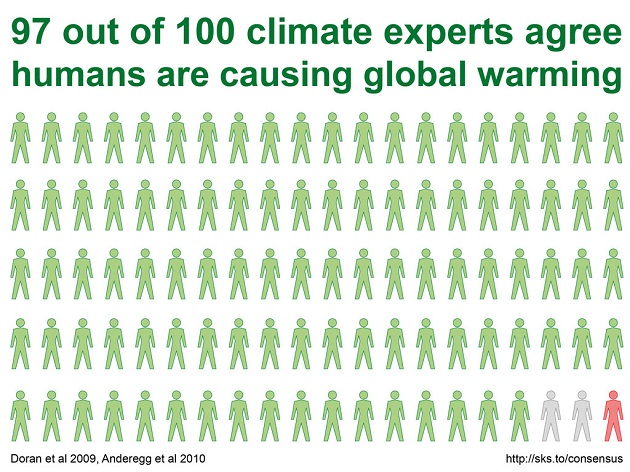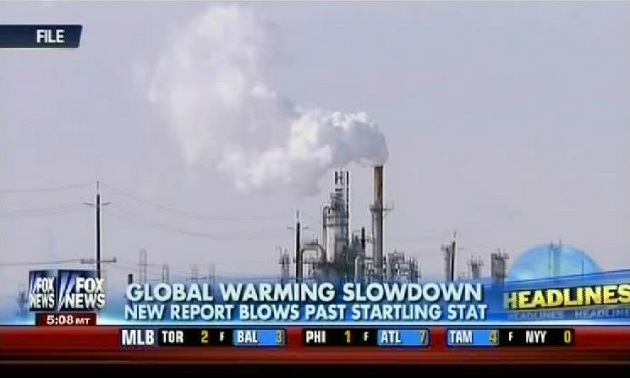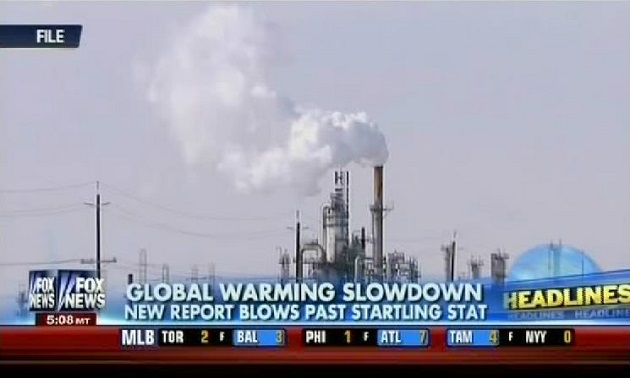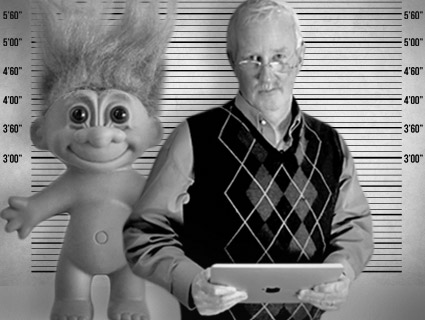
<a href="http://www.shutterstock.com/pic-98528708/stock-photo-newspaper-detail-on-white-background-with-shallow-depth-of-field.html?src=ha0Q3T4LDNVTFmHgm4XDyA-1-98">M. Unal Ozmen</a>/Shutterstock
If you’ve looked through the letters sections of US newspapers, you’ve probably read that human-caused global warming is a “hoax” and a “myth.” You’ve also likely read about how “mankind cannot change the earth’s climate” and how the carbon dioxide we release isn’t a “significant factor” driving global temperatures.
But recently, the Los Angeles Times took a stand against this type of misinformation. Paul Thornton, the paper’s letters editor, wrote that he doesn’t print letters asserting that “there’s no sign humans have caused climate change.” Why? Because, he wrote, such a statement is a factual inaccuracy, and “I do my best to keep errors of fact off the letters page.” He cited the UN Intergovernmental Panel on Climate Change’s recent statement that scientists are at least 95-percent certain humans are causing global warming.
Does this mean the Times will never publish a letter skeptical of climate change? Not necessarily. Thornton told Climate Desk that he evaluates all letters on “a case-by-case basis” and that he would consider running one from a climate scientist with “impeccable credentials” who disagreed with the scientific consensus. But he says those letters are unusual. “I don’t get a lot of nuance from people who question the science on climate change,” he explains. Rather, he says, letters frequently portray climate change as a “hoax” or a “liberal conspiracy.”
Thornton’s announcement drew praise from some scientists and activists, and Forecast the Facts, an advocacy group “dedicated to ensuring that Americans hear the truth about climate change,” launched a petition drive calling on other major papers to follow suit. “The idea that opinion pieces should be based in the realm of facts is nothing new,” argues Brad Johnson, the group’s campaign manager.
So how do other newspapers handle climate-denying letters? Climate Desk contacted editors across the country to find out.
The Washington Post
The Washington Post was one of several papers that said they agreed with the Los Angeles Times’ policy against running clearly inaccurate letters but argued that this still leaves significant room for publishing climate skepticism.
“It’s our policy as well not to run letters to the editor that are factually inaccurate, so we wouldn’t publish a letter that simply says, ‘there’s no sign humans have caused climate change,'” Washington Post letters editor Mike Larabee said in an email. “That’s a broad absolute that doesn’t take into account the existence of large amounts of science indicating otherwise.”
He added, however, that the Post wants its letters section to reflect a “broad spectrum” of views and that it has “published letters that are skeptical or raise questions about the scientific consensus. In general, these have been letters that we think make informed and interesting points challenging the science or the way it’s used. It’s a complex topic that’s no more above critical scrutiny than anything else.”
Larabee pointed to recent letters printed by the Post, including one that stated, “Remember, had there not been climate change, we’d never have gotten out of the Ice Age.”
The Dallas Morning News
The Dallas Morning News doesn’t have “a firm policy” on climate change letters, according to Michael Landauer, the paper’s digital communities manager, though he added that he plans to discuss the matter further internally. “In the past, we have run letters where people express doubt or take shots at those who accept the climate change consensus, but I’m not sure I would print one that says flat-out that there ‘is no sign’ climate change is caused by humans,” he wrote in an email. “It may be their underlying belief on which they base their letter, but if someone were to assert that in that way, I don’t think I’d allow it.”
The Tampa Bay Times
Tim Nickens, editor of editorials at the Tampa Bay Times, said that his paper has a “broad policy” that letters must be accurate. He said the paper probably wouldn’t print a letter asserting that “humans aren’t contributing to climate change at all” if that claim wasn’t backed up by scientific studies. He added that letters are assessed on a “case-by-case basis.”
USA Today
Brian Gallagher, editorial page editor at USA Today, said his paper has an “aggressive” fact-checking process that applies to all letters and op-eds and that it won’t print anything that is “flatly false.” Beyond that, he said, the paper gives letter-writers “as much latitude as possible…to express their opinions.”
USA Today’s editorial board—which Gallagher oversees—has a clear stance on global warming: It’s real; there’s overwhelming evidence humans are causing it; and urgent action is needed. But Gallagher says that none of those positions is “completely closed out” from debate in the paper, so “it depends on the phrasing of the particular letter.” He explained that although the bar for disputing climate change is increasingly high, the paper might allow a writer to cite contrarian scientists in order to argue against the scientific consensus.
Gallagher argued that the IPCC’s 95-percent certainty that humans are warming the planet doesn’t mean that contrary views should be left out of the paper. “Sometimes the 5 percent is right,” he said. “You have to give people who believe the 5-percent opinion their say.”
So how does this play out in practice? Last week, USA Today published an editorial calling for action to mitigate and adapt to climate change. It also ran an “opposing view” column from Joseph L. Bast, president of the “free-market” Heartland Institute, who made the misleading argument that “no warming has occurred for the past 15 years.”
On Thursday, USA Today printed a range of responses to its editorial, including a letter that asked:
Could you please tell me why Americans should believe your editorial as opposed to the opposing view written by Joseph Bast, president of the Heartland Institute? His response makes as much sense to me as what you have written.
The theme now is that so many things are tied to global warming, whether it be early snowstorms or the number of hurricanes this year.
The American people are rightly confused, and all we can do is feel the weather. In Charlotte, we have had a colder than normal winter, spring and summer, so I am going with no global warming.
The Plain Dealer
Cleveland’s Plain Dealer treats its letters section as essentially self-correcting.
“We don’t censor letters to fit our editorial board agenda…although our editorial board’s position is that global warming is happening and that the world needs to respond more urgently,” said Elizabeth Sullivan, opinion director for the Northeast Ohio Media Group, in an email.
Sullivan said that the Plain Dealer tries not to publish “nonfactual” assertions like the hypothetical one cited by the Los Angeles Times (“there’s no sign humans have caused climate change”). But she suggested that a letter the paper did run this summer—which claimed that “[s]ince there is no increase in temperatures, there certainly is no support for a greenhouse effect from carbon dioxide”—had been effectively refuted by subsequent letter-writers:
Our readers, who include many scientists with expertise in this area, since Cleveland is home to a large NASA research center, offer their own corrective to readers who, in their view, hit foul balls in this arena. The July 15 [letter] you cite…was challenged by several readers in letters that we published in the following week. One of those letters noted that the July 15 letter writer did not provide specific data to back up his assertions, then discussed in detail the way long-since-discredited data are often used to support such assertions. This pattern tends to repeat itself when we carry letters and columns on this topic.
The Houston Chronicle
Jeff Cohen, executive editor, opinions and editorials, for the Houston Chronicle, has a similar take. “Letters columns are reflective of the community’s opinion, and, occasionally, even ill-informed writers get their say in print,” he said. “The letters are a continuing dialogue, and you hope that maybe the next one you receive corrects or addresses the issues that are contentious in the previous one.” Cohen added: “The goal is to provide a venue for the varying voices of Houston. The editorial page and the letters column is the marketplace of ideas. It’s the place where we have debates…A debate often happens because a wrong idea has been put forward.”
The Denver Post
“We will publish letters skeptical that humans are causing climate change, depending on what the rest of the content is,” said Denver Post editorial page editor Vincent Carroll in an email. In January, his paper ran a letter arguing that human-caused global warming is a “scam” perpetrated by “long-discredited propagandists” seeking to protect their government funding.
Carroll expanded on his answer in a column Friday, writing that he is “reluctant to shut down reader discussion on issues in which most scientists may share similar views.” Carroll referenced a debate that took place in the Post‘s letters section following the paper’s publication of a July column in which Charles Krauthammer criticized President Obama’s climate policy:
Over a period of weeks, we published letters back and forth in reaction, covering issues such as the reliability of climate models, degree of scientific consensus and natural climate variability.
Most skeptics of any sophistication recognize that global warming has occurred and appreciate that some or much of it in recent decades could be caused by human-generated greenhouse gas emissions. But they tend to believe, for example, that there are more uncertainties in the science than generally conceded, that the relative dearth of warming over the past 15 or more years is a blow to the models and that the U.N.’s Intergovernmental Panel on Climate Change has demonstrated consistent bias in favor of alarmist interpretations.
Surely readers should be free to debate such points.
The San Diego Union-Tribune
Asked on Twitter if his paper would “follow suit” after the Los Angeles Times announced its policy on climate change letters, San Diego Union-Tribune editorial and opinion director William Osborne responded, “No,” and added that his paper would “continue to print a full range of views on all issues.”
Osborne subsequently elaborated over email: “We have always followed a policy of not publishing material in the newspaper that we know to be factually inaccurate; that’s nothing new for us, nor, I suspect, most newspapers. And, yes, we will continue to publish a full range of views on all issues. Those policies are not mutually exclusive.” Asked whether he considered the example cited by the Times—”there’s no sign humans have caused climate change”—to be factually inaccurate, Osborne responded:
Yes, I do consider it to be factually inaccurate. I subsequently had a discussion with our letters editor to reaffirm our policy.
And, to be clear, the editorial position of this paper for some time now has been that we accept the science that says the globe is getting warmer, and that it is caused in part by human activity. The question, in our view, is what to do about it. Reasonable people will differ about that, as the lack of action by Congress and many governments throughout the world demonstrates.
















